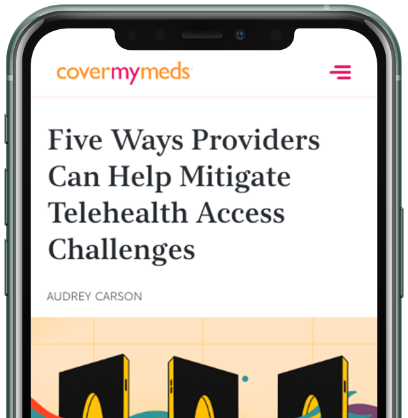Beyond the Coat: CoverMyMeds Pharmacists Share Their “Why”
Over the last several months, healthcare has changed more rapidly than during any other time in recent memory. During this time of change and transition, the role of pharmacists has grown only more important. For American Pharmacists Month, we’re celebrating a few of our own at CoverMyMeds.

The Covid-19 pandemic has made it increasingly clear just how essential pharmacists are — and how they’re often a patient’s first or primary source of medication guidance.
On top of their principal role helping patients adhere to their medications, pharmacists have also handled new expectations — from administering COVID-19 tests to having more in-depth clinical conversations. It's clear pharmacists' part in patient care will only continue to expand. In honor of American Pharmacists Month, we asked three of CoverMyMeds’ staff pharmacists to discuss their journey, the impact of our mission, hopes for the future of the industry and their “why.”
Megan Marchal — Pharmacist in Charge, CoverMyMeds Specialty Pharmacy
Megan, who serves on the State of Ohio Board of Pharmacy, joined CoverMyMeds after serving as clinical outreach coordinator at the Ohio State University Wexner Medical Center. She began her career at Walgreens, managing several Central Ohio locations.
Ultimately, I’m a people person, and I want to make sure I’m helping people — because, quite frankly, it’s not always easy for patients to get their medication.
That’s what drew me to specialty pharmacy — there are just too many people receiving denials for medications they really need.
I helped open Ohio State’s 340B pharmacy and served as the liaison for doctor’s offices, helping providers and their teams set up and understand workflows. I talked with them about the most difficult aspects of prescribing specialty drugs, and I received a lot of insight into the issues providers experience. Back then (around 2012), many people were still just learning the differences between specialty and retail prescriptions.
In 2014, one of the first therapies for treating chronic hepatitis C, Harvoni, was approved. For some patients, it was $28,000 for a month’s supply. And, on top of helping them understand their diagnosis, it was my responsibility to help them navigate this affordability issue, get them on therapy, help them manage side effects and help get them to a cure.
Understanding how to help patients navigate the complexities of specialty medication is what’s most important to me. When I think of our mission — to help patients get the medication they need to live healthy lives — I think about how this is even more critical for patients living with chronic conditions. And it’s about more than helping them access their therapy — it’s about helping them stay on therapy once they’ve started.
As for the future: We need to make things easier for pharmacists, providers and their patients. We need solutions that involve the least amount of touches. And we need to consider how we can automate the approval process while still leaving room for patient choice. It’s important we help patients own their journeys. Technology makes a big impact here, and I’m excited to see how we continue to innovate.
Eric Wu, Clinical Pharmacist
Eric joined CoverMyMeds in 2019 after seven years at the Ohio State University Wexner Medical Center. Prior to joining the medical center, he spent two years with CVS.
Growing up, I loved art and music, but it turns out, I wasn’t great at either — minimal talent. I knew I wanted to help people, and my parents reminded me often that patients are “patients” for a reason — they have something they need help fixing or improving. I chose to become a pharmacist because it felt like a great opportunity to maximize impact while getting to connect with patients on a personal level.
Being able to establish the relationships I have — with patients and my coworkers — has been one of the greatest joys this profession has gifted me. As for our mission to help patients, my background at various pharmacies allows me to provide unique perspectives and ideas on how we can improve their access to the medications they need to live healthy lives.
When I think about what I hope for the future of our industry, I think it’s important to note that, within the community setting, our profession has been struck with decreasing margins and an excess in workforce supply. I'd love to see pharmacy training continue to evolve toward more creative problem solving. I think this approach can help new pharmacists find non-traditional routes to positions they love — positions in which they’ll be able to make an impact in ways that haven’t yet been realized.
Kyle Dresbach, Pharmacist in Charge
Kyle leads CoverMyMeds’ ScriptHero pharmacy. He honed his leadership skills in the U.S. military, serving as U.S. Air Force Pharmacy Officer in Charge.
At 17 years old, I made the decision to become a pharmacist to, quite simply, help patients. As I’ve grown in my career, my reasons have become more refined. As a pharmacy intern and in my first few years of practice, I was most energized by patient interactions — by the ability to help a single patient achieve an outcome for their health. Today, I’m most fulfilled when I’m focused on developing solutions that impact a wider spectrum of patients. However, the only way you can do that is by reflecting on the early days and those individual encounters, those moments in which you can distinctly recall the impact you had on someone’s life.
At CoverMyMeds, my team’s focus is on delivering innovative patient access solutions that help patients in an always-changing healthcare landscape. I believe there’s a lot of opportunity here. When I think about our role as pharmacists, I’d like to see us elevated within the healthcare system and given more opportunities to leverage our education to improve patient outcomes. To that end, I’d like to see our routine activities become even more automated.
I’d also like to see the role of pharmacy technicians elevated in a tiered manner, and many pharmacist activities don’t specifically require the advanced training of the pharmacy doctorate degree. The military and Department of Veterans Affairs have done a great job here, and many states are starting to pass regulations to allow for this. My hope is to see this approach spread throughout the country, so the full value of the pharmacy technician can be revealed. As anyone who’s been a pharmacy customer knows, pharmacy technicians are the backbone of the pharmacy — and will continue to be so in an expanded capacity. With this shift and greater automation, I think the outcome will be a safer, more cost-effective healthcare system with pharmacy professionals inspired by the work they do every day.
The latest healthcare insights, floated right to your inbox.



